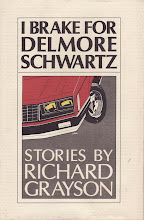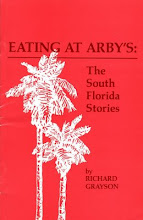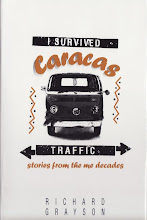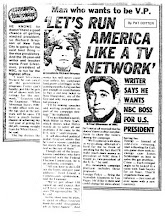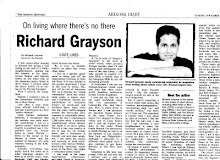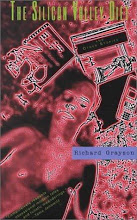At 8 a.m. today we were at beautiful Freestone Park in Gilbert to watch the start of the Ka-Pow! Superhero Adventure Run, a race featuring the East Valley's least lethargic costumed crimefighters.
We enjoyed ourselves a lot. Too bad the Joker was disqualified after the race when he tested positive for steroids. Police Commissioner Gordon arrested him and took him off to the Gotham City jail, where he'll be sharing a cell with fellow supervillains Roger Clemens and Bobby Bonds. Kids, don't let this happen to you!
Other than that, it was a fantastic race and a wonderful morning, and we're grateful to all the superheroes who participated fairly at Freestone Park.
Saturday, April 28, 2012
Friday, April 27, 2012
Thursday Night in Mesa: Mesa Community College Theatre + Film Arts presents "Dog Sees God: Confessions of a Teenage Blockhead" at Theatre Outback
Tonight we had the thrill of going to Mesa Community College's Theatre Outback to catch a brilliant performance of Bert V. Royal's breakout hit from the 2004 New York International Fringe Festival, the triumphantly raunchy Dog Sees God: Confessions of a Teenage Blockhead. Directed with masterly precision by James Rio and featuring a standout cast of young actors, this joyously raunchy parody features the Peanuts comic strip characters fast-forwarded to the kind of angsty teendom seen in the smartest high school movies and TV shows dating back to Fast Times at Ridgemont High, Heathers, and Dawson's Creek, only with sharper wit and a lot more exhilarating uses of the F word.
Born in 1951, we were part of the generation that grew up on the daily adventures of good ol' Charlie Brown and his crew, spending childhood allowance money on the series of collected strips in paperback. As we grew up, we devoured The Gospel According to Peanuts, A Charlie Brown Christmas and its TV sequels with the iconic Vince Guaraldi music; the upbeat and winsome Broadway musical You're a Good Man, Charlie Brown (our first girlfriend in college played Snoopy in a Brooklyn high school version in 1970; we didn't see her, but our second and third girlfriends and some random boyfriends did and said she was great); the stuffed animals (our little bro, ten years younger, dragged around a dirty plush beagle for years); the Hallmark greeting cards (easiest thing for parents' birthdays); MetLife commercials and ads -- until finally we were fucking sick of the pint-sized neurotics and their nauseatingly whimsical pets.
Later, of course, we realized Schultz's genius and could appreciate him anew in the current millennium. As our friend, the filmmaker and novelist Brian Pera wrote us in October 2001, weeks after 9/11:
I've been reading a lot of Charles Schulz lately. Maybe that explains the nagging despair. Read a book of interviews with him and a wonderful collection of his strips just put out. I hadn't realized how wonderful they are, I'm ashamed to say. What an amazing man. So simple and touching, and really deep for it all.
Dog Sees God is a sly, dark, extremely funny transformational use of Peanuts, and in sure hands -- as it is in this production of the Mesa Community College Department of Theatre and Film Arts -- the play manages to work perfectly.
The director modulates the action so that the actors, in particular the perfectly-cast Diondre Price as the endearingly stolid, questioning (in more than one sense of the word), frustrated linchpin of a group of teenagers dealing with more "issues" than in a zillion After School Specials, effectively conquer the script's most nagging problem: how to reconcile the highly funny, vulgar and knowing pop social satire with the topical gruesome melodrama (prefiguring Tyler Clementi) and search for meaning engendered by the death of a beloved object, be it boy or dog. This tightrope can be a real difficulty in staging Royal's play, so baseball caps off to director James Rio.
The director modulates the action so that the actors, in particular the perfectly-cast Diondre Price as the endearingly stolid, questioning (in more than one sense of the word), frustrated linchpin of a group of teenagers dealing with more "issues" than in a zillion After School Specials, effectively conquer the script's most nagging problem: how to reconcile the highly funny, vulgar and knowing pop social satire with the topical gruesome melodrama (prefiguring Tyler Clementi) and search for meaning engendered by the death of a beloved object, be it boy or dog. This tightrope can be a real difficulty in staging Royal's play, so baseball caps off to director James Rio.
The best our generation could do to defile the once-ubiquitous Peanuts-inspired slogan "Happiness is a warm puppy" was change the two P's in puppy to double-S (and there's a lot, and we mean a lot, of hilarious talk -- and even singing -- about pussy in this show). But as Dog Meets God opens, the dog's no longer even lukewarm: C.B.'s beloved beagle has expired of rabies, having dismembered and killed his little yellow bird companion in his crazed death throes. So much for peace, love, Woodstock, flowers.
As someone who worked as a staff attorney at a think tank researching tons of intellectual property issues, we admire how deftly the playwright and his initial producers' high-powered lawyers managed to avoid litigation by United Features Syndicate and the Schultz estate by advising the oblique but still-obvious references to characters who will be copyrighted and probably trademarked for decades to come.
So Charlie Brown is C.B.; Linus (Van Pelt) is Van; Sally Brown and Lucy are C.B.'s Sister and Van's Sister; Peppermint Patty and Marcie are Tricia and Marcy; Schroeder is Beethoven; and the high school's sex-crazed, homophobic and mysophobic jock gets enraged when anyone makes reference to his former filth-encrusted past (C.B.'s Sister taunts him with an allusion to the comic strip character's name: "Where swine live!) is an ex-Pigpen now called Matt.
In the various workshop, festival and off-Broadway productions, the actors were often fairly well-known young character actors from TV and film: both Patrick Fugit and Eddie Kaye Thomas played C.B., and other cast members included Anna Paquin, America Ferrera, Logan Marshall Green, and Eliza Dushku.
We'd bet anything the MCC cast tonight was as good or better than most of them. The choices they made (particularly in regard to line readings), their comic timing, the seamless and slippery interaction nearly always seemed to work. It may be in some sense C.B.'s story that begins with his existential quest to determine the ultimate fate of his dead dog, but like Peanuts itself, it's the ensemble that makes it work in this world where kids -- yes, they're still kids -- deal with alcoholism, endless varieties of drug abuse, child molestation, gay-bashing, group sex, obsessive-compulsive behavior, anorexia and bulimia, exhibitionism, voyeurism, boy-on-boy kissing, and heartbreak.
In addition to Diondre Price, who's onstage for all but two of the 22 scenes in two acts and carries much of the play's forward movement on his broad, if shrugging, shoulders, the other actors also create memorable characters. As C.B.'s Sister, the spunky Goth/Wiccan girl, Brittany Woodbury is hilariously touching. Her Drama Club rehearsal -- she's the club's sole member -- for her one-woman show depicting her transformation from caterpillar to platypus (or something) gets the biggest laughs of the night and makes us recall too many evenings on the Lower East Side watching pretentious performance artists playing the same kind of thing straight. But nobody's too straight in this play.
As the ersatz-Zen Buddhist stoner Van, Solomon Cruz uses his expressive voice, body language, and mannerisms to create a fresh version of a stock character. Whoa, just watching him react silently to the other characters is almost as funny as when he speaks the wisdom -- or gibberish -- of the marijuana he's constantly smoking. Um, he's also smoked his old blanket, after C.B. and Van's own sister set it afire a few months before the play's action has begun.
In her one scene ("Fire is Bad") as Van's Sister, Taissa Zveiter gives a bravura performance as a jailed pyromaniac, the sympathetic psychotic ("I love lithium!") C.B. visits in prison for advice. And yes, even in the joint (not the kind her brother smokes), the doctor is in. Incredibly vulgar, intensely angry, Van's Sister moves blithely from sarcasm to pathos (her secret abortion), and Zveiter and Price work so well in that one extended scene that you really believe in the depth of their longtime friendship (and mutual wariness).
Sean Ryan McBride is superb as Beethoven, the artistic outcast, the sweet tormented kid who's taken more abuse than Charles Schultz's mind could have dreamed of (or perhaps not, if you read a recent biography). As they circle each other suspiciously, McBride and Price as the two former friends -- one now liked by everyone, the other a pariah -- make beautiful music together (not a metaphor) even as their renewed relationship confuses and ultimately undoes them.
As Matt, Jesse Kinser makes a recklessly violent, oafishly sexist cretin both lovable and surprisingly sympathetic. Like most of the cast members, he's skilled at physical comedy: just watch him prepare to do his mindless pushups by spraying the ground under his hands with antibacterial sanitizer. Kinser turns the stereotype of the mindless adolescent jock into a compelling antihero.
The play's best riffs belong to the mean girls Tricia and Marcy as portrayed by Bianca Mihalcesu and Tobie Rash. Whether they're in the high school cafeteria dishing dirt on fat-ass Freida (one of many references to comic strip characters not portrayed in Dog Meets God), drunkenly extolling the virtues of the spork, giving a novel explanation of the meaning of WWJD? or competing at coming on to boys at a teen house party with Fellini Satyricon-like debauchery, the pair have the most consistently funny lines in the script.
Ultimately, however, Dog Sees God proves to a moving study of the effects of isolation and ostracism on human beings and the loss of adolescent innocence. The efficient and deceptively simple set (designed by Lindsey Halfhill, with the assistance of Aaron Dilley, with set dressing by Jessi Watson) functioned flawlessly as a variety of venues for the characters. Costume designers Kenzie Woods and Ben Papia must have had fun with some of the outfits, like C.B.'s Sister's pretentious Goth gear and Van's slightly out-of-date stoner garb, but their choices were excellent and interestingly and subtly color-coordinated. Kudos also to Aaron Dilley (lighting design), Travis Williams (sound design), Cameron Blickensdorf (prop design), Glenn Star (assistant technical director, and Tammy Gilbert (stage manager).
God Meets Dog: Confessions of a Teenage Blockhead has two more performances, on Friday night at 7 p.m. and Saturday afternoon at 2 p.m. The winner of the 2004 GLAAD Media Award for Best Off-Off-Broadway production, it can be truly terrific theater when done as well as it was done tonight at MCC. We were also impressed with the displays in the lobby on Charles Schultz, the Peanuts characters, a table with material for the great One-n-ten organization, and a poster on "10 Ways to Be a Str8 Ally."
From August 2000 to May 2001 we were on the MCC campus every Tuesday and Thursday morning for our 7:30 a.m. English 101 (fall) and English 102 (spring) classes. We lived just the other side of the Superstition Freeway (U.S. 60), in a little studio (half-underground) at the apartment complex then called Quail Creek. We fondly remember teaching at MCC on those mornings -- the shortest walk to work we had in 37 years of teaching at over 20 colleges -- and we're grateful for the chance to have been on campus tonight to see Dog Sees God.
Subscribe to:
Posts (Atom)































































